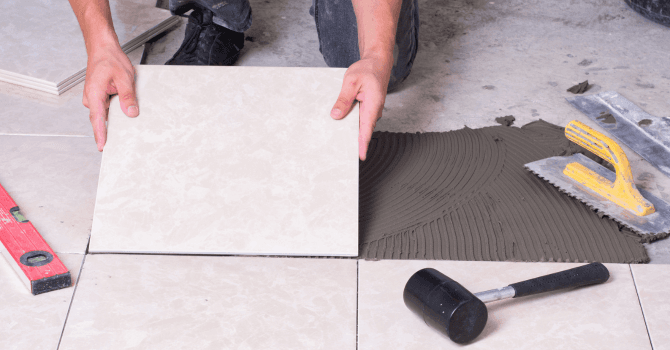
Tiles are crafted with different materials. Having a clear understanding of said materials means choosing aesthetic and hard-wearing wall and floor coverings. Here are 6 of the most used types of tiles, whether indoors or outdoors.
What are the different types of tile materials?
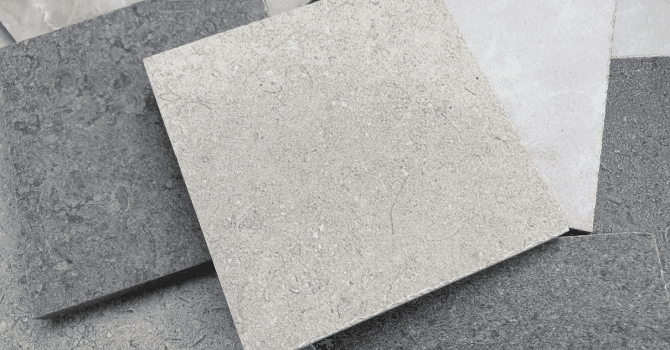
Source: Canva
Yanick Dupré, Dupré Carrelage Inc., mentioned that tiles are effectively made using many different types of materials:
Aluminum;
Ceramic;
Terracotta;
Glass (enamel and glass paste);
Cement.
1. Aluminum tiles
Aluminum is a luminous tile material that reflects light, thus enhancing the aesthetic appeal of the room in question. It’s perfect as a kitchen backsplash or to protect the area right beneath your range hood, said material is increasingly used inside.
Average cost: $40/sq. ft.
2. Ceramic tiles
Tile materials that are best known as “ceramics” are plentiful:
Sandstone;
Tin-glazed;
Natural terracotta.
These can be added during the manufacturing process:
Quartz;
Kaolin (China clay);
Feldspar.
Clay is what gives tiles their final shape and volume. Materials such as quartz and feldspar then add strength and uniformity to it.
Essentially, there are two types of ceramic tiles:
Red body tiles;
White body tiles.
Red body tiles are made up of fibre-rich clay. The latter is both cost-effective and extremely porous. To the extent that, if red clay tiles were to be laid outside, they would shatter at the first frost.
White body tiles aren’t much less porous. Their white clay or kaolin base simply allows for a high-end and resilient tiling, especially to impacts when dual-fired (first without enamelling, then a second time with enamelling).
Average cost: $2,50 - $24/sq. ft.
So, does this mean that ceramic tiles can't be laid both indoors and outdoors? Actually, no. That's where porcelain stoneware ceramic tiles come in.
Porcelain Stoneware
Among porcelain stoneware, two types can be distinguished: full-body ceramic stoneware and glazed ceramic stoneware. In both cases, the tiles are:
Especially resistant to impacts;
Highly resilient;
Impervious to chemicals;
Non-abrasive;
Impervious to cracking when frozen over.
The only difference is that the former has a similar-coloured surface to that of a biscuit porcelain, while the latter is heat-coated with a layer of enamel.
Finally, "stretched" sandstone tiles consist of stoneware that has been stretched rather than pressed during the manufacturing process. Laying stretched stoneware is generally done directly on the ground, whether indoors or outdoors, provided the porous nature of the product allows it.
3. Terracotta tiles
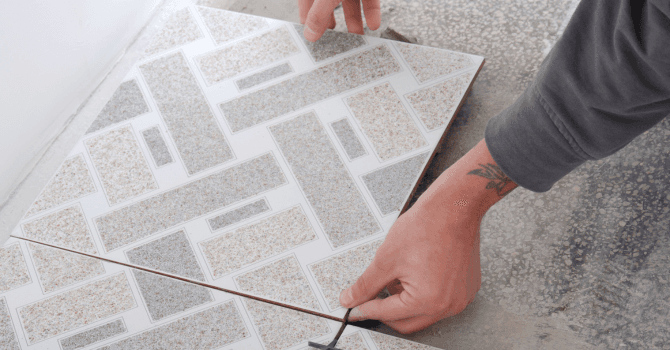
Source: Canva
Made of clay and sand, terracotta tiles get their pale yellow to dark brown colour from the earth. Terracotta is among those highly porous materials used for tiling.
Once the tiles have been laid, and before the tiles are grouted, a hydrophobic treatment should be applied to the surface. A waterproofing agent is then added to fully protect the tiles.
Terracotta has many interesting qualities:
Moisture resistant
Easy maintenance;
Doesn’t feel cold to the touch;
Ideal for indoor or outdoor use;
Anti-slip.
However, while terracotta is easy to lay indoors and outdoors, whether on walls or floors, certain types of terracotta are especially susceptible to impacts. As is the case with glazed terracotta, and should be limited to wall installations (bathroom, kitchen backsplash, etc.).
Average cost: $9 - $35/sq. ft.
4. Glass tiles
Glass tiles are made up of two materials:
Glass pastes;
Enamels.
Glass pastes are tiny, iridescent, plain or metallic tiles that are glued together to make mosaics. Their main benefit is that they're highly resistant to impact, heat, and scratches even.
Unlike terracotta or natural stone, glass mosaics don't require any water or chemical treatments.
Glass tiles are easy to clean and ideal to fit in with the lines and curves of any surface, making them the perfect finishing touch in any kitchen or bathroom.
Another glass medium could be Émaux de Briare tiles, which can be installed indoors and outdoors. They're wear-, shock-, and UV-resistant, fully impervious to chemicals, and waterproof.
By adding a flux to the mixture of calcine, crystalline rock, and sand, the resulting enamel becomes more easily vitrified and tinted during the firing process. Since they're extremely thin, they can be glued directly onto an existing floor. It's the exact opposite approach to natural stone tiles, which we’ll now delve into.
Average cost: $6 - $45/sq. ft.
5. Natural stone tiles
Natural stone tiles are smooth and raw, with white, black, brown, or blue nuances, thus lending the space in question a unique, charming look. Whether inside or outside, natural stones adorn both floors and walls, with two major advantages:
Wear- and impact-resistance;
Don’t fade over time.
The only downside to using natural stones is their maintenance and weight.
Laying natural stone tiles not only requires the use of a hydrophobic treatment to render the porous surface water-repellent but also regular maintenance to preserve its gloss. This is especially important for highly porous limestone. Without crystallization treatment, such tiles are stain- and scratch-prone.
Natural stone tiles are thicker than tiles made of other materials and are typically between 0.8 to 2 inches thick. Hence, they’re made heavier to provide identical mechanical resistance.
As such, when picking out your tiles, if you land on natural stone tiles, note whether:
The tiles add too much height to the floor;
And if they can withstand the intended load.
Once you’ve answered these questions, you can choose the tile material that you prefer:
Igneous rock (granite, basalt, porphyry);
Sedimentary rock (sandstone, travertine, white rock);
Schist (slate);
Metamorphic rock (marble).
Average cost: $9 - $30/sq. ft.
6. Cement tiles
Cement tiles are made from mortar and pigmented marble powder, and are now trending again. Like natural stones and ceramics, cement needs to be well protected by a triple-action treatment:
Hydrophobic;
Waterproof;
Oil-repellent.
Although wax is also used during this treatment, never clean your cement tiles with bleach or acidic household products. The only acidic product you can apply to cement is one that can remove any leftover laitance from the installation process.
One last piece of advice: If you notice signs of efflorescence on the tiles you were shipped as a result of laitance during the in-plant drying process, all you have to do is gently sand the tiles with water to remove the efflorescence. All you need is sandpaper.
Average cost: $5 - $20/sq. ft.
Best Tile Options
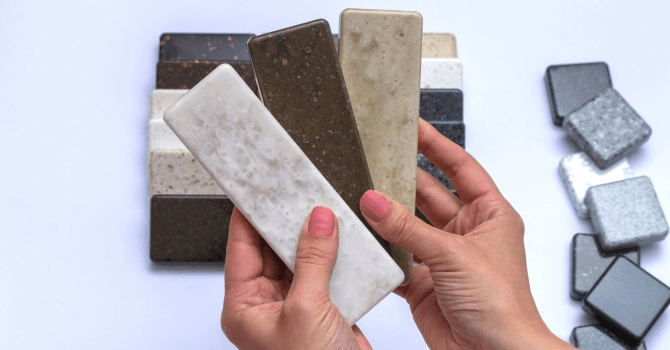
Source: Canva
Choosing the right material depends on the room you want to tile. Tiling materials come in all sizes and styles:
Enamelled or glazed ceramic;
Aged or bumpy material;
Pearlescent colour;
Contemporary factor;
etc.
Indoor tiles
Ceramic tiles;
Mosaic;
"Stretched” sandstone;
Terracotta;
Glass tiles;
Natural stone tiles;
Tin-glazed.
Outdoor tiles
Porcelain stoneware;
Terracotta;
Glass;
Cement;
Natural stone tiles.
Tiling Ideas
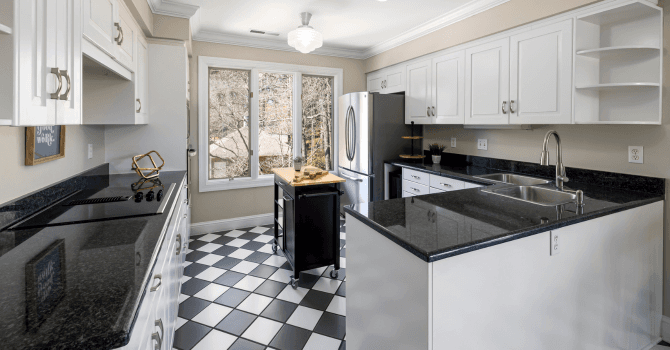
Source: Canva
Wall treatment
Tiles can be laid in several areas throughout a home. However, wall tiling is mainly done in wet areas (bathrooms and kitchens). It protects walls and makes them easy to clean.
However, you can also lay tiles outdoors, notably along your patio, swimming pool, or on walls specially designed to create a lounge area. Bear in mind that ceramics can also be used to design beautiful mosaics.
Floor tiles
In a home, certain areas must have easy-to-clean flooring. Notably in the kitchen, in which cooking and food splatters are a daily occurrence (especially if you have young children).
Tiles aren't merely an ally when it comes to cleaning, they're also a durable flooring material, even in high-traffic areas (kitchen, stairs, entryway, basement, etc.).
For outdoor use, tiles can be laid across your patio or walkway. Your garage and driveway can also be tiled. And many materials have the mechanical strength to withstand the load of a car.
What’s the best bathroom tile?

Source: Canva
Porcelain stoneware is the perfect material to tile your bathroom since it meets one crucial requirement: it's easy to clean. After all, hygiene is the most important aspect of a bathroom, to prevent germ proliferation and mould growth.
In this respect, porcelain stoneware comes out on top. Not only can it be easily cleaned, but it's also really hard-wearing. And, because it’s available in a wide range of formats and sizes, porcelain stoneware can be adapted to all bathroom sizes.
What’s the best tile size for a bathroom?
Some industry experts still recommend using small tiles for smaller-sized bathrooms. However, it's simply outdated wisdom. It's merely a preconceived notion that large tiles weigh down smaller bathrooms.
It’s quite the opposite, really. Large tiles convey a feeling of spaciousness that small tile surfaces lack. So, why is this belief that small tiles are best for smaller bathrooms?
This trend can be traced back to long ago when large tiles were first developed. It was customary to lay small tiles in the bathroom, especially as large tiles required specific cuts for the patterns to be aesthetically pleasing.
Let your imagination run wild, choose tiles of various sizes and of different colours, whether as borders or murals, laid straight, at 45°, herringbone or offset. That said, choose and lay your tiles as you wish.
Looking for something else?
Related articles
The latest industry news, interviews, technologies, and resources.

Cynthia Pigeon
•08 Nov 2023
The banister, though it is often overlooked, is an integral part of our daily lives. What's more, we tend to forget how important the chosen model actually is, which tends to be dependent on the material it is made out of.

Editorial Team
•08 Nov 2023
Removing stains, paint or discolouration streaks from surfaces can be difficult, especially if they’re quite stuck in. There are plenty of methods and potential solutions on the market for dealing with them. Sandblasting has long been used as a solution to combat set-in stains, or in situations where the paint needs to be stripped from the surface it's on.

Cynthia Pigeon
•02 Aug 2024
Despite efforts in recent years to dispel stigmas and raise awareness regarding mental health concerns amongst the general population, of the five assessed work sectors, the construction industry has one of the highest suicide rates. What could possibly explain the alarming results shown by these studies?

Editorial Team
•18 Jan 2025
Has your son or daughter grown up a lot and their childhood bedroom isn’t cutting it anymore? Well then, it’s about time to redecorate their slice of heaven to revamp their bedroom according to their personality and the young adult they’re quickly becoming. Here are some ideas to serve as inspiration for your teenager’s future bedroom design project!

Editorial Team
•15 Nov 2024
Given our harsh winter, a decent heating system is a must-have to reap the benefits of a warm, comfortable home. However, as you're probably well aware since the day you paid your first utility bill, a cozy dwelling isn’t cheap.